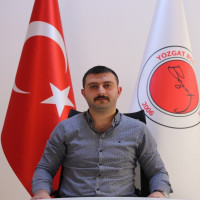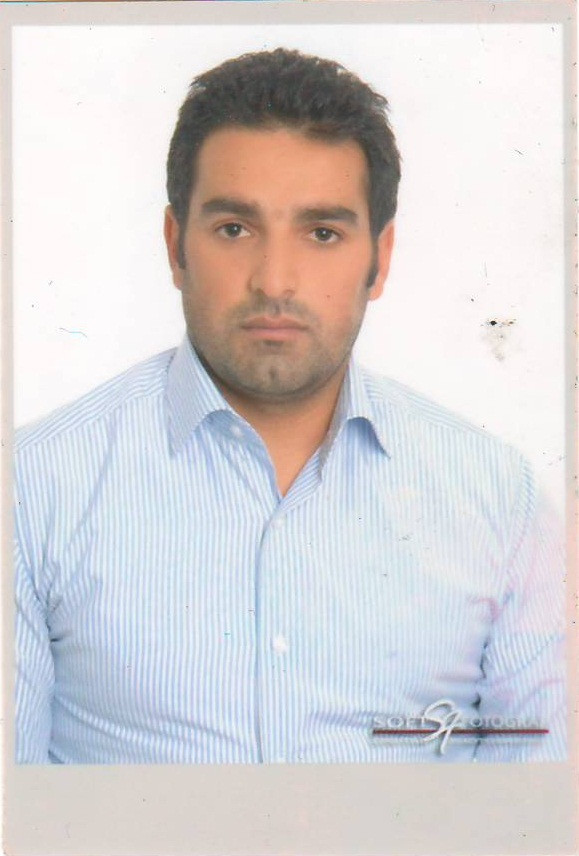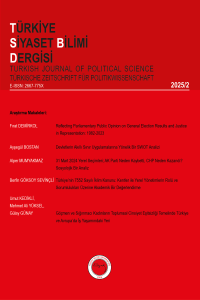Research Article
Issue Editorial Board



Issue Reviewers



Aim & Scope
The Journal of Turkish Political Science aims to publish analytical and cognitive studies in the field of political science based on both theoretical and empirical research, conducting analytical examinations of developments both in Turkey and internationally, and offering projections about the present and the future in order to advance an academic perspective. From this standpoint, the journal’s purpose is to contribute to the political science literature and to share academic findings with both the national and international scholarly community.
The Journal of Turkish Political Science is an international, peer‑reviewed, electronic academic journal published twice a year, in March and September, by the Faculty of Economics and Administrative Sciences of Bozok University. It publishes articles in Turkish, English, and German. The journal covers all fields of political science—such as political theory, comparative politics, international relations, and public administration—and includes original articles, research notes, scholarly reviews, and analytical studies. In addition, it welcomes contributions from related subfields of the social sciences, including but not limited to political sociology, political psychology, political history, and international law.
Author Guidelines
Writing Guidelines
1. The writing rules for the journal can be found in the template available at https://dergipark.org.tr/tsbder. Submissions that do not conform to the template will not be considered for review.
2. Each article must include an abstract (not a summary) of no fewer than 150 and no more than 250 words in the language in which the study is written, followed by an abstract in a second language.
3. Articles—including abstracts, footnotes, and references—must be no fewer than 4,500 words and no more than 7,500 words. Book reviews should be between 1,500 and 2,000 words.
4. Articles must include a bibliography in which all referenced sources are listed alphabetically, and in-text citations must be complete and accurate (including year, edition, etc.).
5. All copyrights for articles published in both print and electronic form belong to Yozgat Bozok University. All rights reserved. No part may be reproduced without prior written permission from the university.
6. When citing sources used in the preparation of articles, the APA Style must be followed (http://www.apastyle.org/learn/quick-guide-on-references.aspx).
7. Articles must be submitted through DergiPark: https://dergipark.org.tr/tsbder.
8. Contact address: siyasetdergisi@yobu.edu.tr
Ethical Principles and Publication Policy
Ethical Principles and Publication Policy
General
The Journal of Turkish Political Science upholds an academic publishing approach in accordance with ethical standards to achieve the objectives stated in its publication aims. All articles in our journal are subject to impartial review by referees. Throughout the publication process, all parties contributing to the journal—including the publisher, editors, authors, and reviewers—are obliged to comply with ethical rules.
In this process, the principles set forth in the guidelines published by the Committee on Publication Ethics (COPE) must be followed. From the moment an article is submitted through DergiPark, ethical principles are taken into account. The Journal of Turkish Political Science reserves the right to request corrections, to publish, or to reject articles uploaded to the system.
Responsibilities of the Editorial Board
• The Editorial Board and Editors/Associate Editors are responsible for the publication process and subsequent stages of articles uploaded to the system for publication in the Journal of Turkish Political Science.
• The Editorial Board is responsible for determining and implementing all matters related to the evaluation process, double-blind peer review, ethical issues, and publication decisions.
• The fact that an article uploaded to the system has been sent for peer review does not constitute a commitment that the article will be published. Even if reviewers submit positive reports, the final decision rests with the Editorial Board and Editors/Associate Editors.
• To ensure originality and prevent plagiarism, the Editorial Board checks the submitted article through the iThenticate program.
• In the event of any allegations of plagiarism or misconduct regarding submitted or published articles, the Editorial Board initiates an investigation. In proven cases of plagiarism, the Editorial Board reserves the right to retract the article. Furthermore, it may inform the relevant institutional authorities of its findings.
Responsibilities of Editors / Associate Editors / Issue Editors
• Editors, associate editors, and issue editors are responsible for protecting intellectual property rights, preventing unethical conduct, and taking measures against plagiarism during the publication process.
• When making decisions regarding submitted articles, they must consider the article’s originality, its contribution to the field, the reliability and validity of its research methods, clarity of expression, and whether it aligns with the journal’s scope and policies.
• To prevent any misconduct, editors and issue editors implement a double-blind peer review policy. The identities of authors and reviewers remain confidential to prevent bias or favoritism.
• Editors ensure the protection of personal data in line with publication policies and ethical principles.
• Editors act with particular sensitivity regarding the protection of human and animal rights in articles to be published.
• Editors verify whether studies involving experimental research or surveys have received ethics committee approval; if approval is lacking, the article is rejected.
Responsibilities of Reviewers
• The opinions expressed in referee reports are the basis for the Editorial Board’s publication decisions.
• Reviewers must evaluate manuscripts anonymously under the double-blind review system, acting fairly and impartially.
• Reviewers must comply with confidentiality policies and may not share information about the manuscript. They must not use information obtained during the review process for their own benefit.
• Reviews should be objective and supported by arguments that contribute to the field. The Editorial Board does not consider biased or unsubstantiated criticism. Evaluations without an approval or rejection recommendation are not accepted, and a new reviewer is appointed in such cases.
• Reviewers should decline review invitations if they have a personal or institutional conflict of interest with the manuscript.
• Reviewers must inform the Editorial Board if they detect plagiarism, duplicate publication, or simultaneous submission.
• After completing their evaluation, reviewers must delete or destroy the manuscript to maintain confidentiality.
• Reviewers must ignore factors such as gender, religious beliefs, nationality, or political views and provide impartial evaluations.
• Reviewers are required to complete their evaluations within the specified time frame. Reviewer comments are sent to authors, and if necessary, reviewers may review revisions.
Responsibilities of Authors
• Manuscripts submitted via DergiPark must not contain plagiarism. A plagiarism report is mandatory for article submission. Authors are required to obtain the report through intihal.net on the article submission page. The similarity rate of articles submitted to the journal must not exceed 20%. Articles must be original and contribute to the field.
• Any form of plagiarism—even self-plagiarism—is a serious ethical violation. In case of detected plagiarism, the article will be returned and the review process terminated. If plagiarism is discovered after publication, the Editorial Board will take necessary action.
• Authors may withdraw their manuscripts during the publication process, but they must inform the Editorial Board.
• Authors must not use discriminatory language based on race, gender, language, culture, belief, or class.
• Manuscripts must not infringe on the intellectual property rights or privacy of third parties.
• All individuals who have contributed significantly to the manuscript must be listed as co-authors, while those who have not contributed must not be listed. In jointly authored manuscripts, publication requires the approval of all authors.
• Authors should not propose changes to the author list (adding/removing authors or changing order) during the review process.
• If the manuscript is based on a thesis or a previously published preliminary version, this must be stated on the first page.
• Authors must comply with applicable copyright laws and regulations.
• Authors must provide additional information about the manuscript to the editorial office upon request during the evaluation process.
• Authors are expected to implement revisions suggested by reviewers or editors. If they disagree, they must submit their justifications to the editorial office.
• Authors must notify the editorial office if they discover any errors in their published articles and collaborate in issuing corrections.
• For studies requiring ethics committee approval, the necessary approval must be obtained and stated in the manuscript.
Peer Review Process
Articles submitted to the Journal of Turkish Political Science undergo a double-blind peer review process, ensuring mutual anonymity between authors and reviewers. Each submission is reviewed by at least two external independent reviewers who are experts in their respective fields, to guarantee an impartial evaluation process.
Submissions first go through a technical evaluation stage. At this stage, editorial office staff check whether the manuscript has been prepared and submitted in accordance with the journal’s guidelines. Submissions that do not comply with the journal’s rules are returned to the authors along with requests for technical corrections.
Submissions that comply with the journal’s rules are assigned to the Editor-in-Chief. The Editor-in-Chief evaluates each submission in terms of scope and quality for its suitability for the journal. Manuscripts deemed unsuitable for the journal may be rejected at this stage.
For manuscripts deemed appropriate for the journal, the Editor-in-Chief works with the Associate Editors to assign reviewers. Once assigned, Associate Editors may decide to reject a manuscript, proceed with the double-blind review process, or request revisions before peer review begins.
Associate Editors submit their recommendations to the Editor-in-Chief based on the reports provided by the reviewers. Revised manuscripts are re-evaluated by the Associate Editor, who may work again with reviewers to form a new recommendation.
For all submissions, the Editor-in-Chief is the final authority in the decision-making process.
In case of delays, if authors notify the journal of the reason, they are given the option to withdraw their manuscripts.
When the peer review process is completed, authors will receive the anonymous peer review reports and the editorial decision on their manuscript. Peer review reports will not be made public in any medium. All submitted material is treated as confidential and must not be used in any way until publication.
Authors may suggest reviewers during submission. The responsible editor has sole discretion in deciding whether the suggested reviewers will be invited to evaluate the manuscript.
Reviewers must comply with COPE’s Ethical Guidelines for Peer Reviewers, which provide a framework for maintaining the integrity and impartiality of the double-blind review process.
Potential reviewers must disclose any conflicts of interest to the editor before accepting an invitation to review a manuscript. This information allows the editor to make an informed decision on whether to include the reviewer in the evaluation process, thereby ensuring the integrity and transparency of the review process.
Communication between editors and reviewers contains confidential information that must not be shared with third parties.
The Journal of Turkish Political Science will assign external editors to manage the double-blind peer review processes of articles submitted by members of the editorial board. In the event that a member of the editorial board submits a manuscript, the Scientific Journals Coordination Office of Yozgat Bozok University will identify and invite an editor who is an expert in the relevant field, independent from both Yozgat Bozok University and the author’s institution. A system account will be created for the invited editor, who will be asked to proceed with and monitor the double-blind peer review process. The invited editor acts independently in their decision.
If the peer review of a manuscript deviates from the journal’s standard policy, the type of review conducted will be indicated in the article to ensure transparency of the evaluation process.
Reporting a Breach of Ethical Principles to the Editor
If you detect any breach of ethical principles concerning the editors, reviewers, or authors of the Journal of Turkish Political Science, or if you notice an ethical violation in any article in early view, please report it via email to siyasetdergisi@yobu.edu.tr.
Price Policy
Dergimize makale gönderiminde ücret talep edilmemektedir.
Indexes
Other Indexes
Journal Boards
Editor-in-Chief

Editor

Associate Editor

Editorial Board





Copy Editor
Language Editors (Proofreaders)

Section Editors


1988 yılında Konya'da doğdu. İlk ve orta öğretimini Eskişehir'de tamamladı. Lisans eğitimini Selçuk Üniversitesi İktisadi ve İdari Bilimler Fakültesi İktisat Bölümünde 2010 yılında; yüksek lisans eğitimini Karabük Üniversitesi Sosyal Bilimler Enstitüsü İktisat Anabilim Dalında 2016 yılında ve doktora eğitimini Aksaray Üniversitesi Sosyal Bilimler Enstitüsü İktisat Anabilim Dalında 2022 yılında bitirdi. Halen Karabük Üniversitesi İktisadi ve İdari Bilimler Fakültesi İktisat Bölümünde Dr. Öğr. Üyesi olarak görev yapmaktadır. Makro İktisat bilim alanında ekonomik büyüme, istihdam ve para-banka alanlarında çalışmalarını sürdürmektedir.









